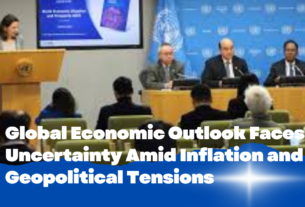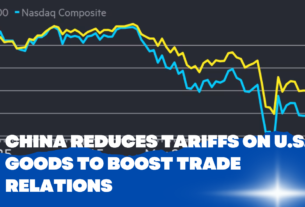Britain’s economy is gaining momentum, but global trade tensions particularly from US tariff policy pose a renewed risk to recovery.
The UK economy may be emerging from a period of stagnation, but renewed global trade tensions particularly the potential re-escalation of tariffs under former US President Donald Trump’s policies could undermine progress, the International Monetary Fund (IMF) has warned.
In its latest country report, the IMF upgraded the UK’s 2024 GDP growth forecast from 1.1% to 1.2%, citing signs of an ongoing economic recovery and improved domestic indicators. However, it warned that global trade headwinds are likely to weigh on the UK’s performance in 2025, reducing growth by an estimated 0.3 percentage points.
The caution comes amid rising concerns over the potential return of a more protectionist US trade stance under Trump, whose previous administration introduced sweeping tariffs on a range of goods, including vehicles, steel, and aluminium.
Trade Deal Offers Relief, But Risks Remain
Last month, the UK struck a notable trade agreement with the United States aimed at easing some of those tariffs. Under the new deal, US import duties on British vehicles have been cut from 27.5% to 10%, while tariffs on steel and aluminium have been eliminated. However, a general 10% tariff on a wide range of other UK goods remains in place.
Despite the breakthrough, the IMF remains concerned about the broader implications of renewed trade friction between major economies.
“Trade tensions will weigh on growth through persistent uncertainty, slower activity in UK trading partners, and the direct impact of remaining US tariffs on the UK,” the IMF noted in its assessment.
Downing Street echoed this sentiment in a statement, affirming that “trade wars are in nobody’s interests,” and reiterating the government’s focus on strengthening trading relationships with both the EU and the US, Britain’s two largest trading partners.
Recovery in Progress, But Uneven
The report comes at a time when the UK appears to be gaining economic traction after several challenging years marked by Brexit disruption, pandemic fallout, and inflationary pressures. According to the IMF, this year’s improved performance is being driven by resilient consumer demand, a gradual easing in inflation, and positive wage growth.
Chancellor Rachel Reeves emphasized the government’s commitment to economic reform and investment, stating:
“The UK was the fastest-growing economy in the G7 during the first quarter of 2024. We’re delivering results through strategic trade agreements, wage growth, and investments that support long-term productivity.”
The IMF’s medium-term outlook remains cautiously optimistic. It projects UK GDP growth of 1.4% in 2026, but it underscored the potential for downside risks particularly if global trade disputes escalate or supply chain disruptions re-emerge.
Structural Reform Seen as Key to Resilience
Alongside its trade concerns, the IMF welcomed the UK government’s recent efforts to pursue structural reforms. It cited improvements to planning regulations and increased infrastructure investment as potential catalysts for long-term productivity and growth.
“The authorities’ structural reforms, including planning, and the increase in infrastructure investment could increase potential growth if properly implemented,” the report stated.
The Fund also supported the Bank of England’s recent decision to begin lowering interest rates, calling for a “gradual easing of monetary policy” as inflation stabilizes and economic conditions normalize. The Bank reduced its base rate to 4.25% earlier this month, marking its lowest level since May 2023.
Outlook: Navigating Growth in a Volatile Global Landscape
While the UK economy is beginning to show signs of recovery, the IMF’s analysis underscores the complex interplay between domestic progress and external pressures. Structural reforms and strategic trade diplomacy could help anchor growth, but the risk of renewed global trade disruption particularly from the United States remains a key threat.
As the UK charts its economic course for 2025 and beyond, much will depend not only on policy execution at home, but also on the outcome of political developments abroad, including the direction of future US trade policy.




